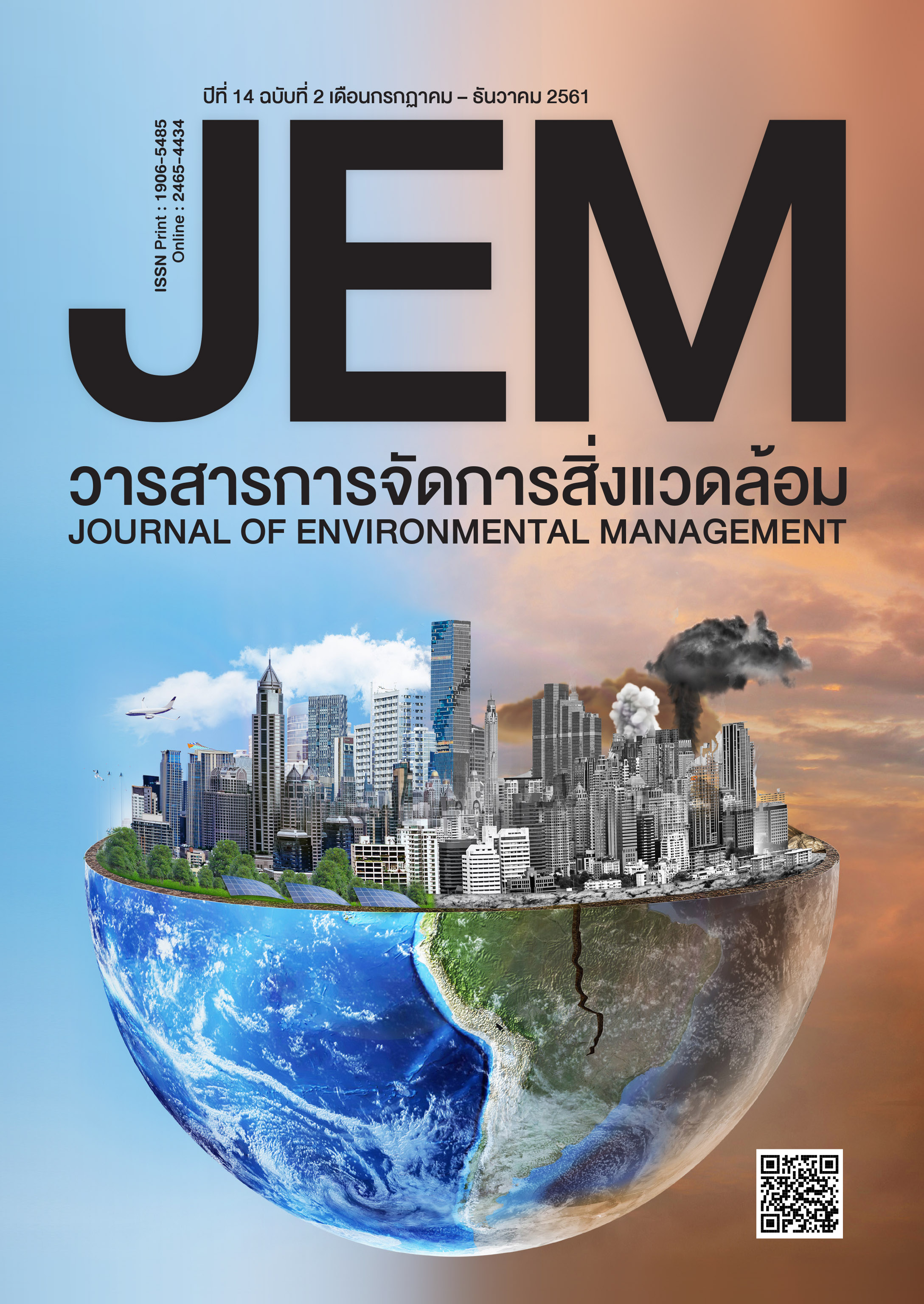วิวัฒนาการแนวคิดของการพัฒนาที่ยั่งยืน EVOLUTION OF THE CONCEPT OF SUSTAINABLE DEVELOPMENT
DOI:
https://doi.org/10.14456/jem.2018.13คำสำคัญ:
การพัฒนาอย่างยั่งยืน, เป้าหมายการพัฒนาอย่างยั่งยืน (SDGs)บทคัดย่อ
แนวคิดเกี่ยวกับการพัฒนาที่ยั่งยืนที่เป็นที่ยอมรับว่าสามารถบูรณาการสิ่งแวดล้อมและการพัฒนาเข้าด้วยกันเกิดขึ้นรายงานของ World Commission on Environment and Development (Our Common Future, 1987) หรือเป็นที่รู้จักกันว่า Brendtland Report ประเทศที่กำลังพัฒนา (ประเทศทางใต้) เห็นว่าแนวคิดดังกล่าวลำเอียงเข้าข้างประเทศที่พัฒนาแล้ว (ประเทศทางเหนือ) เนื่องจากประเทศที่ได้พัฒนาไปแล้ว ไม่ต้องการให้ประเทศทางใต้ใช้ทรัพยากรธรรมชาติในการพัฒนาประเทศ เป็นการสาปแช่งให้ประชาชนในประเทศทางใต้ยากจนและพึ่งพาประเทศทางเหนือตลอดไป ในการประชุมเกี่ยวกับสิ่งแวดล้อมทุกครั้งคือที่ Rio de Janerg 1992, Johannesbary 2002, และ Rio de Janeiro 2012 ประเทศทางเหนือจะตีความแนวคิดการพัฒนาอย่างยั่งยืน ตามแนวคิดของตนเอง แต่ประเทศทางใต้ได้ต่อต้านอย่างแข็งขัน โดยประเทศทางใต้ได้เสนอให้สหประชาชาติจัดการกำหนดเป้าหมายการพัฒนาเพื่อต่อสู้กับความยากจน ความอดอยาก การไม่รู้หนังสือ โรคภัยไขเจ็บ ฯลฯ เพื่อให้ประชาชนในประเทศทางใต้หลุดพ้นจากทุกขเวทนามากกว่าการปกป้องสิ่งแวดล้อมเพียงอย่างเดียว ที่ประชุมสุดยอดแห่งสหัสวรรษขององค์กรสหประชาชาติจึงได้ร่วมกันกำหนดเป้าหมายของการพัฒนาเพื่อขจัดคววามยากจน ความอดอยาก ฯลฯ (Millennium Development Goals, 2000) ขึ้น โดยมีประเด็นสิ่งแวดล้อมเป็นเป้าหมายหนึ่งในแปดของเป้าหมายการพัฒนาแห่งสหัสวรรษ ต่อมาประเทศทางใต้ได้เสนอในการประชุมสิ่งแวดล้อมที่ Rio ในปี 2012 ให้สหประชาชาติจัดตั้งคณะทำงาน เพื่อกำหนดเป้าหมายของการพัฒนาอย่างยั่งยืนซึ่งเป็นการบูรณาการแนวคิดของประเทศทางหนือและประเทศทางใต้เข้าด้วยกัน หลังจากนั้นสหประชาชาติจึงได้จัดประชุมสุดยอดเกี่ยวกับ Sustainable Development Goals ขึ้นในปี 2015 และที่ประชุมได้มีมติเป็นเอกฉันท์ให้ SDG’s เป็นแนวทางปฏิบัติในการขจัดความยากจนภายในปี 2030 ต่อสู้กับความอยุติธรรมและปกป้องสิ่งแวดล้อมเพื่ออนาคตที่ยั่งยืนของโลก
เอกสารอ้างอิง
2. Charoensin-o-larn, C. (1999). Development Discourse [in Thai]. Bangkok, Thialand: Sombat Publishing.
3. Charoensin-o-larn, C. (2001). Introduction Post-structuralism [in Thai]. Bangkok, Thialand: Sombat Publishing.
4. De la Court, T. (1990). Beyond Brundtland: Green Development in the 1990’s. New York , USA: New Horizons Press.
5. Dobson, A. (1998) Justice and the Environment. New York, USA: Oxford University Press.
6. Dresner, S. (2002). The Principles of Sustainability. London, UK: Earthscan.
7. Fahn, J. (1997, June 23). Earth Summit’s Five Wasted Years. The Nation, 6.
8. Gaunt, J. (2002, August 7). Ten Years After Rio, At Least the Issues Are Now Clear. The Nation, 5A.
9. Hanley, C.J. (1997, June 23). Third World Unhappy As Leaders Converge for Another Rio. The Nation, 6.
10. Huckle, J. & Martin, A. (2001). Environments in a Changing World. Harlow, Essex: Prentice Hall.
11. Jordan, A. & O’Riordan, T. (1995). Sustainable Development : The Political and Institutional Challenge. In Kirkby, J. et al. (Eds), The Earthscan Reader in Sustainable Development (pp 287-289). London: Earthscan.
12. Kanie, N. & Biermann, F. (2017). Governing through Goals. Cambridge, Massasusette: The MIT Press.
13. MacDonald, M. (1998). Agendas for Sustainability. London: Routledge.
14. McCormick, J. (1989). Reclaiming Paradise. Bloomington, Indianna: Indiana University Press.
15. Naess, A. (1997) Sustainable Development and the Deep Ecology Movement. In Baker, S. et al. (Eds), The Politics of Sustainable Development (pp 62 – 71). London: Routledge.
16. Newton, L.H. & Dillingham, C.K. (1994). Watersheds: Classic Cases in Environmental Ethics. Belmont, California : Wadsworth.
17. Osborn, D. & Bigg, T. (1998). Earth Summit II: Outcomes and Analysis. London, UK: Earthscan.
18. Ostrom, E. (1990). Governing the Commons. Cambridge, UK: Cambridge University Press.
19. Porritt, J. (2006). Capitalism: As If the World Matters. London, UK: Earthscan.
20. Sessions, G. (1995). Introduction : Toward the Twenty-First Century and Beyond. In Sessions, G. (Eds), Deep Ecology for the 21st Century (pp 411-416). Boston, USA: Shambhala.
21. United Nations. (1992). Agenda 21: Programme of Action for Sustainable Development. N.Y., USA.: Department of Public Information.
22. Verrengia, J.B. (2002a, August 22). There’s A Slim Chance Rio’s Promises Will be Fulfilled. The Nation, 7A.
23. Verrengia, J.B. (2002b, September 6). Summit Leaves Little to Celebrate. The Nation, 7A.
24. The World Commission on Environment and Development. (1987). Our Common Future. Oxford, UK: Oxford University Press.
25. Young, O.R. (2017). Governing Complex Systems. Cambridge, Massasusett: The MIT Press.
26. Zeller, F. (2002). Greens Say WTO Has Hijacked the Summit. The Nation, 7A.



